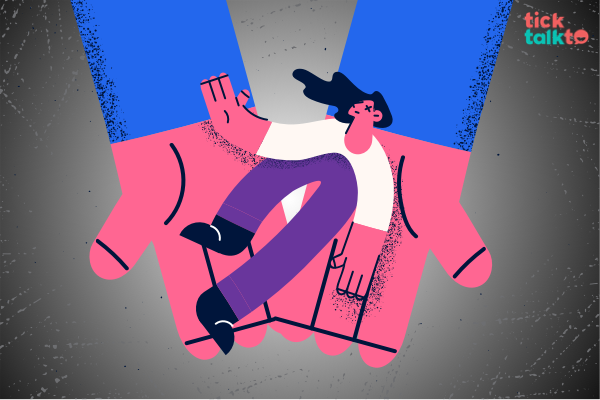What is self- harm?
Self-harm is a form of behaviour in which an individual deliberately injures himself by cutting or burning or harming themselves in any other self- injurious way. It’s a sign of emotional distress and a form of a coping mechanism.
Prevalence of the behaviour
Self-harm is very common and affects more people than we would imagine.
It occurs mostly during teenage and young adulthood but can occur even at a later stage in life. Those individuals who have experienced trauma, neglect or abuse are most susceptible to it.
Myths about self-harm
It’s not an attempt to take one’s life (suicide) and also it’s not a way to seek attention.
Signs of self-harm
Behavioural symptoms
- Spending a lot of time alone
- Storing sharp objects or matches/lights and other implements of self-harm at hand
- Not indulging in pleasurable activities that were once enjoyed
- Facing challenges in friendships and romantic relationships
- Mood swings and impulsive behaviour
- Obvious injuries justified and brushed off as accidental.
- Unnecessary and obvious covering of arms, legs and other exposed parts of body even in warm weather.
- Blood stains found on towels, bedding or personal clothes.
Physical symptoms
- Visible fresh cuts and scratches
- Burns
- Bruises
- Unexplained Fractures
- Patches of missing hair
Cognitive symptoms
- Feelings of helplessness
- Feelings of hopelessness
- Feelings of worthlessness
- Existential Anxiety
- Identity crisis
Psychosocial symptoms
- Emotional instability
- Emotional numbing
- Increased anxiety around self-injury
- Feelings of shame, guilt and disgust
- Social withdrawal
Co-morbid conditions
- Early childhood trauma
- Obsessive compulsive Disorder (OCD)
- Post-traumatic Disorder (PTSD)
- Borderline personality Disorder (BPD)
- Depression and depressive Disorder
- Dissociative Disorders
- Anxiety Disorders
- Bipolar Disorder
- Schizophrenia
- Alcoholism
- Substance abuse Disorder
Understanding self-harm (based on self-reports)
- A way to deal with difficult feelings, painful memories and overwhelming situations or experiences
- Way to express emotions that they find hard to put into words
- Turn invisible thoughts and feelings into something visible
- Convert emotional pain into physical pain
- Helps reduce the sting of overwhelming emotions
- Gives a sense of being in control
- Gives a false sense of pleasure as pain relieving chemicals that are released due to physical injury give a feeling of high
- Helps escapes traumatic memories
- Way to punish themselves for their feelings and experiences
- Helps cope with feelings of numbness, disconnectedness and disassociated-ness
- Gives a reason to care for oneself physically
- Helps express suicide ideation without actually taking one’s life
Facts about self-harm
- Self-harm gives a momentary sense of relief but is unable to take away the real cause for distress.
- Self-harm may result in throwing open difficult emotions and thus making a person feel worse than better.
- Self-harm creates a dependency on it and once developed, takes a long time to stop.
The course of self-harm
It’s a vicious cycle. Feelings of anxiety and heightened emotions are followed by a strong impulse to self-harm. In trying to resist this impulse they feel more tension. The person is then more likely to engage in self-harm to release this tension. Right after the act of self-harm the person experiences feelings of shame and guilt. These negative emotions further lead to anxiety thus restarting the cycle.
Coping with self-harm
On the surface, self-harm seems to be serving a purpose for the person who acts out the behaviour but it is only a stop gap fix for a more severe underlying problem. This problem if not addressed will only make self- harm a consistent and more dangerous feature in one’s coping mechanism.
Treatment for self-harm
The treatment of self-harm requires an eclectic approach based on whether it is associated with a mental health disorder like depression or borderline personality disorder, the treatment plan then focuses on that disorder along with the self-injurious behaviour.
Psychotherapy and talk therapy
The treatment option best suited for self- harming behaviour is psychotherapy. Psychotherapy, popularly known as talk therapy or psychological counselling entails;
- Identifying and managing the underlying issues that are causing the impulse to self-harm
- Developing coping skills to manage distress
- Enhancing emotional regulation
- Developing better social skills
- Building a strong self-image
- Working on tangible goals to overcome the issue of self-harm
Various techniques for psychotherapy and talk therapy
Some effective individual psychotherapy techniques include;
Cognitive Behavioural Therapy (CBT)
It helps to identify unhealthy, negative thoughts and beliefs and replace them with positive , adaptive ones.
Dialectical Behaviour Therapy (DBT)
It’s a type of cognitive behavioural approach that teaches you emotional regulation, coping with stress and improving your relationships.
Mindfulness based therapies
It involves the use of breath work as a grounding technique to help stay in the present. Connecting with the five senses in the present moment and with the environment around us helps to urge surf and ride the wave of impulse to self-harm.
Top 10 free helplines in India that help people with suicidal thoughts
If you are feeling suicidal or have suicidal thoughts, help is at hand, please call any of the following helplines or visit the nearest hospital.
AASRA
AASRA1 is Suicide Prevention and Counselling NGO which provides free and confidential support for people in distress, prevention and crisis resources for you or your loved ones.
Phone: 9820466726
Email: aasrahelpline@yahoo.com
Time: 24 hours, 7 days a week
iCALL
iCall2 is a telephone and email based counselling service run by School of Human Ecology, Tata Institute of Social Sciences, that offers free telephone and email-based counseling services, to individuals in emotional and psychological distress, across age, language, gender, sexual orientation and issues, through a team of qualified and trained mental health professionals.
- Phone: 9152987821
- Email: icall@tiss.edu
- Time: Monday to Saturday: 10:00 am to 8:00 pm
Roshni Helpline
Roshni3 is a Hyderabad based Non-Governmental Organization (NGO) and provides free and confidential emotional support for self-harm and suicidal tendencies.
- Phone: 040 66202000 / 66202001
- Email: roshnihelp@gmail.com
- Time: 11 am to 9 pm, Mon to Sat
Samaritans Mumbai
Samaritans Mumbai4 is a helpline providing emotional support for those who are stressed, distressed, depressed, or suicidal.
Phone: +91 84229 84528 / +91 84229 84529 / +91 84229 84530
Email: talk2samaritans@gmail.com
Time: 5 PM and 8 PM (all days)
NIMHANS PSSMHS Helpline
NIMHANS5 is the first institute in India to start a helpline inclusively for Psychosocial support and mental health services during disasters. The helpline addresses the psychosocial issues of disaster survivors and creates a tertiary level support system for them during emergencies caused by disasters. It is a 24 x 7 toll free helpline. During disasters, people from any part of the country can call up at this number and avail psychosocial support and mental health services from mental health professionals.
Phone: 080 – 4611 0007 (Toll free)
Email: info@nimhans.ac.in
Time: 24X7
SNEHA
SNEHA’s crisis helpline6 offers free counselling services over the telephone and over email to women and children facing violence and in distress.
Phone: +91 9167535765
Email: crisis@snehamumbai.org
Time: 10 am and 6 pm from Monday to Saturday (first and third)
Vandrevala Foundation
Vandrevala Foundation7 operates a free helpline if you feel depressed or suicidal. You can also get answers related to your own or someone else’s mental health. Call them to speak to one of their trained mental health counsellors.
Phone: +91 9999 666 555
Email: help@vandrevalafoundation.com
Time: 24/7/365
SUMAITRI
SUMAITRI8 is a Delhi based voluntary organization, which is running a crisis intervention center for people who are depressed, distressed or may be feeling suicidal. All help offered by SUMAITRI is free and confidential, the anonymity of both callers and volunteers is maintained.
Phone: 011-23389090 or +91-9315767849
Email: feelingsuicidal@sumaitri.net
Time: 2:00 PM to 6:30 PM 7 Days a Week
COOJ
The COOJ Distress Helpline9 is a befriending helpline that follows the guideline of the befrienders charter10. The principles of the helpline provide the framework within which they offer emotional support to those in emotional distress or feeling suicidal. These services are provided free of cost.
Phone: 0832-2252525
Email: youmatterbycooj@gmail.com
Time: Monday to Friday 1pm to 7pm
Mitram Foundation
Mitram11 is a suicide prevention helpline operating under the registered voluntary organization, Mitram Foundation. They are based in Bengaluru and provide emotional support in English, Hindi and Kannada.
Phone: 080 2572 2573 or 90197 08133
Email: share@mitramfoundation.org
Time: 10 am to 4 pm on ALL DAYS.
Final words
To conclude, self- harm should be taken seriously, no matter what the cause. It is primarily a maladaptive coping mechanism used by individuals to overcome distressing emotions.
One can completely recover from this behaviour with the right help and support.
Please note TickTalkTo does NOT offer crisis counseling or emergency services.

 Navjot Dhillon
Navjot Dhillon


